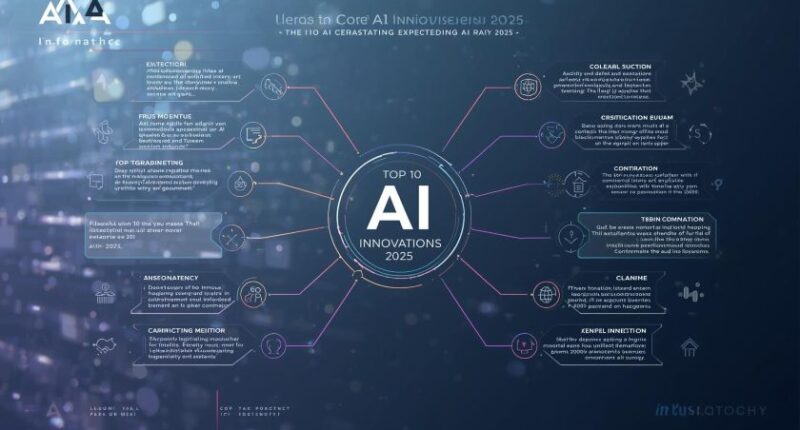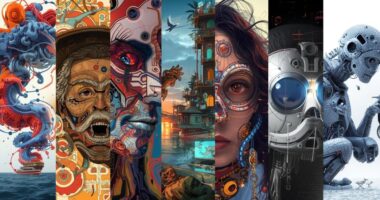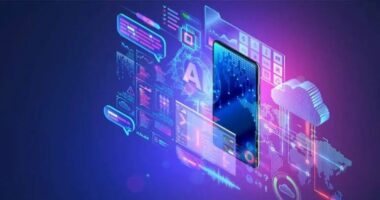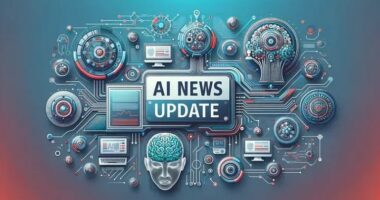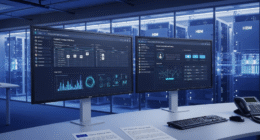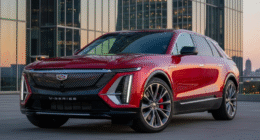Artificial Intelligence (AI) is evolving at an unprecedented pace, shaping how businesses operate, how people live, and how technology interacts with the world around us. As we step into 2025, AI will not only enhance existing systems but also unlock groundbreaking innovations across industries.
This article highlights the top 10 AI innovations that will shape 2025, offering insights into how they will impact businesses, consumers, and society at large.
Why AI Innovations Matter in 2025
AI is no longer confined to science labs or tech companies. It’s now the foundation of digital transformation in healthcare, finance, retail, transportation, and more. Global investment in AI is projected to exceed $500 billion by 2025, proving its role as a driver of growth and innovation.
The year 2025 is expected to mark a tipping point, with AI becoming more intelligent, accessible, and impactful than ever before.
Top 10 AI Innovations That Will Shape 2025
1. Generative AI Beyond Text and Images
Generative AI tools like ChatGPT and DALL·E have already transformed content creation. But in 2025, generative AI will expand into:
-
3D model generation for gaming and virtual reality
-
AI-powered video production for marketing and entertainment
-
Synthetic data creation to train AI systems safely
This shift will enable faster innovation in industries from design to education.
2. AI-Powered Healthcare Solutions
Healthcare is one of the biggest beneficiaries of AI in 2025. Expect innovations like:
-
AI diagnostic systems detecting diseases faster than doctors
-
Personalized treatment plans based on genetic data
-
Virtual AI health assistants providing 24/7 patient support
AI will improve accessibility while lowering healthcare costs globally.
3. Autonomous Vehicles and AI in Transportation
By 2025, AI-driven autonomous vehicles will become more widespread, not just in personal cars but also in:
-
AI-powered public transport systems reducing congestion
-
Self-driving delivery trucks for faster logistics
-
Drones with AI navigation for last-mile deliveries
These innovations will reshape cities and transform supply chain efficiency.
4. AI-Driven Cybersecurity
With cyberattacks becoming more advanced, AI will play a critical role in 2025 security strategies. Businesses will rely on:
-
AI threat detection systems analyzing real-time data
-
Automated response frameworks to stop breaches instantly
-
Predictive cybersecurity models preventing attacks before they happen
AI will ensure safer digital ecosystems in both private and public sectors.
5. AI in Finance and Banking
The financial sector will continue to embrace AI to improve efficiency and customer trust. In 2025, we’ll see:
-
AI-powered fraud detection with real-time transaction monitoring
-
Algorithmic trading platforms driven by machine learning
-
Personalized financial assistants helping users manage money
This will make finance smarter, faster, and more customer-centric.
6. AI for Climate and Sustainability
AI will play a major role in tackling global climate challenges. By 2025, innovations will include:
-
AI-driven energy optimization reducing waste in smart cities
-
AI models for climate forecasting predicting natural disasters
-
Sustainable farming solutions powered by AI to boost food security
Businesses adopting sustainable AI practices will gain competitive advantages while helping the planet.
7. AI in Education and Learning
Education will see a major shift thanks to AI-driven personalized learning. Key innovations include:
-
Adaptive learning platforms adjusting content to student needs
-
AI tutors available 24/7 for learners worldwide
-
Immersive AI-driven VR/AR classrooms creating engaging experiences
AI will make education more inclusive and accessible for all.
8. AI-Enhanced Creativity and Design
AI is no longer just about data—it’s becoming a creative partner. In 2025, we’ll see:
-
AI-generated art and music used in media and entertainment
-
Creative collaboration platforms where AI and humans co-design projects
-
AI-driven design tools helping professionals create faster
This will redefine creativity across industries from advertising to architecture.
9. AI for Business Automation
AI will become the backbone of business operations by 2025. Expect:
-
Robotic Process Automation (RPA) reducing repetitive tasks
-
AI-driven supply chain optimization for faster deliveries
-
Smart virtual assistants streamlining communication
Companies that embrace automation will boost efficiency and profitability.
10. AI-Powered Robotics
Robotics and AI integration will reach new levels in 2025. Examples include:
-
AI-driven humanoid robots assisting in customer service and healthcare
-
Industrial AI robots performing high-precision tasks in factories
-
Collaborative robots (cobots) working alongside humans safely
This will enhance productivity while bridging gaps in labor shortages.
Challenges of AI Innovations in 2025
While AI brings massive opportunities, businesses and society must tackle challenges, including:
-
Ethical Concerns – Avoiding bias and ensuring fairness.
-
Data Privacy – Managing sensitive information securely.
-
Job Disruption – Preparing workers for automation-driven changes.
-
Regulation – Governments will tighten AI policies to ensure responsible usage.
These challenges must be addressed for AI to deliver sustainable progress.
Key Insights for Businesses and Leaders
-
AI will move beyond automation to become a core driver of innovation.
-
Generative AI will expand into video, 3D, and immersive experiences.
-
AI for sustainability will be critical to meeting climate goals.
-
Customer-centric AI applications will dominate business strategies.
-
Ethical AI practices will determine brand reputation and trust.
Conclusion
The year 2025 will be a defining moment for Artificial Intelligence. From generative AI and autonomous vehicles to personalized healthcare and sustainable farming, the innovations ahead will touch every industry and every aspect of life.
Businesses, governments, and individuals who adapt early will thrive in this AI-driven world. Those who hesitate risk falling behind in an era where AI is not just a tool—it’s the future of innovation.
